最新2018-2019学年新目标人教版九年级英语全册教案
人教版英语九年级全册Unit1 SectionA(3a-3b)名师教案

Unit1 SectionA〔3a-3c〕名师教案【教材版本与册数】新目标人教版九年级全一册【单元名称】Unit 1 How can we become good learners?【课时】Section A (3a-3b)〔第2课时〕【课型】Reading(阅读课〕【本课时教学设计】教材版本:新目标册数:第5册年级:九年级单元:Unit1 课型(课时):Section A 3a—3b 阅读课教材分析【本单元话题】围绕学习本身,讲述了学习的障碍及对应的解决方法,对学生有重要意义。
【本单元重点掌握目标】用“by + 动词-ing形式〞构造来表达方式方法。
【教材内容分析】阅读语篇在训练、开展学生阅读水平的同时,能帮助学生意识到提高学习兴趣和改良学习方法的重要性。
活动3A提出三个问题,帮助学生掌握文章主要内容;活动3b将两篇内容和本单元的重点语言构造“by +动词-ing 形式〞结合,对作者使用的英语学习的方法进展梳理。
【综合技能】通过阅读课文,培养好的学习方法,养成良好的学习习惯。
教学目标语言知识目标:1. Talk about how to study. 学会讨论各种学习方法2. Find out your suitable learning methods. 找出适合自己的学习方法。
3. 熟练掌握以下词汇:expression discover secret grammar4. 熟练掌握以下短语:look up connect…with… pay attention to fall in love the secret to…5. 掌握以下句型:How do you study English?I learn by working with a group.Do you learn English by reading aloud?How can I improve my pronunciation?情感态度价值观目标:1. 通过对学习方法的学习,培养学生用正确而科学的方法做事的能力,明白“一份耕耘,一份收获〞。
英语人教版九年级英语教案Unit11新目标-人教新目标版九年级全册
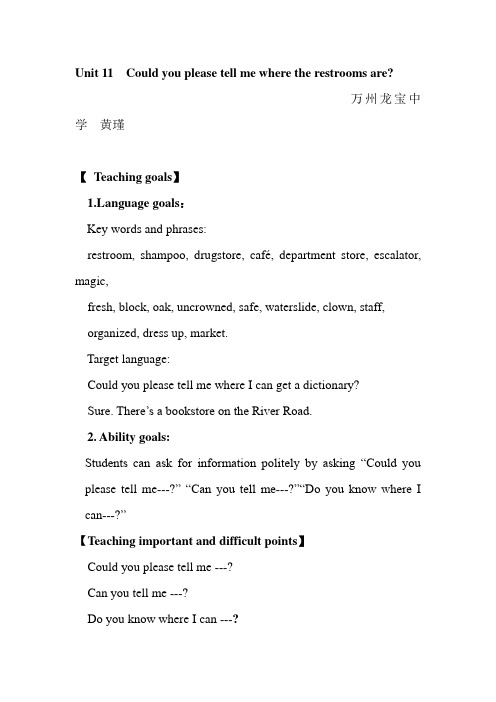
Unit 11 Could you please tell me where the restrooms are?万州龙宝中学黄瑾【Teaching goals】nguage goals:Key words and phrases:restroom, shampoo, drugstore, café, department store, escalator, magic,fresh, block, oak, uncrowned, safe, waterslide, clown, staff, organized, dress up, market.Target language:Could you please tell me where I can get a dictionary?Sure. There’s a bookstore on the River Road.2. Ability goals:Students can ask for information politely by asking “Could you please tell me---?” “Can you tell me---?”“Do you know where I can---?”【Teaching important and difficult points】Could you please tell me ---?Can you tell me ---?Do you know where I can ---?【Teaching methods】Reading, listening, making conversations, discussion in groups 【Teaching aids】A recorder【Teaching procedures】Section AThe First Period (1a—1c)Step1: Greeting and duty reportOne student give a duty report, the other students can ask some questions according to the report.Step2:Lead-inAsk students to pretend they are new to this school.T: How can you ask where the library is?Ss: Can you tell me where the library is?T: There is another polite way you can ask: Could you pleasetell me where the library is?Write down the two questions on the board, and ask Ss to practice the questions.Step3:1aRead the instructions to the class.Read the list of things in the box. Review the meaning of each item.Point to the lettered parts of the picture one by one. What place is this? What do they sell there?Ask Ss to match each thing with a place in the picture, and tell them there may be more one correct answer for some blanks.Step4: 1b ListeningAsk Ss to look at the pictures. Point out the two conversations that are shown in the picture. Say, Listen to the conversations and fill in the blanks with the words you hear in the recording.Play the recording twice. Stop the recording from time to time to allow Ss enough time to fill in the blanks.Check the answers.Step5: 1c PairworkRead the instructions and ask Ss to read the sample conversation.Say, look at the list of things people need and the pictures of the places in 1a.Have a conversation with your partner. Ask your partner politely where you can do these things.Ask a few Ss to present their conversation.Homework:Make a dialogue like 1c and write down in the exercise book.Blackboard Designbuy shampoo /some writing paper/some stampsget some magazines/a dictionary/some informationsave moneyCan you tell me where the library is?Could you please tell me where the library is?--Could you please tell me where I can buy some stamps?--Yes. There’s a post office on the Center Street.The Second Period (2a—2c)Step1: Duty report and revisionOne student gives a duty report as usual.Check the homework. Ask some Ss to read their conversation in pairs.Step2: PresentationAsk Ss to look at the picture in2a.Introduce the places in it, especially the escalator and the elevator.Step3: Listening (2a)You will hear one boy ask another boy how to find something in a shopping mall. The sentences are in the wrong order. Number the directions from 1 to 4.Play the recording twice. Ss write the numbers.Check the answers.2b Listen again. Show how the boy walks to the drugstore. Draw a line on the picture.Play the recording again and ask Ss to draw the line on their own.Check the answers.Step4: PairworkAsk two Ss to read the sample conversation. Have Ss follow the directions by looking at the picture.Say, Make a conversation using information in the picture.Ask Ss to work in pairs, then get one or two pairs to present their conversations.Step5: Grammar FocusReview the grammar box. Ask Ss to read the questions.Write three questions starters on the board:Could you please tell me how to get to ---?Can you tell me where ---?Do you know where ---?Ask Ss to complete each sentence using their own words. Homework:Practice the conversation in 2a, 2b and try to recite it and write their own conversation like this.Blackboard Design1.Take the escalator to the second floor.2.Turn left.3.Go past the bank.4.The drugstore is between ---Q1. Could you please tell me how to get to ---?Q2. Can you tell me where ---?Q3. Do you know where --- ?The Third Period (3a—4)Step1: Duty report and revisionGive a duty report.Ask some Ss to read out their conversations.Step2: Reading (2a)Writing the words advantages and disadvantages on the board, and ask Ss to give examples from their lives. For example,What are the advantages and disadvantages to own a car?Read the first two sentences at the top of the article. Explain that the interviewer will talk to some teenagers.Ss read the article. When they have finished, ask if there are any words or sentences they don’t understand. Write them and ask other Ss to explain them in their own words.Then Ss read the interview again and write the advantagesand disadvantages.Check the answers.Step3: GroupworkAsk Ss to read the sample conversation.You can talk about places where you usually hang out and the advantages and disadvantages of each place.Ask Ss to work in groups. As they work, move around the room offering help as needed.Ask a few groups to present their conversation.Step 4: DrillingRead the instructions to the class.Read the example in the box.Ask Ss to say the names of some stores and other places in the town and write them on the board.Divide the class into some groups. Each group chooses one place to write about. Write careful directions from the school to each place, but do not say the name of the place. When the groups are ready, they read their directions to the class and the other Ss guess the names of the places.HomeworkWrite a place you usually hang out and tell the reasons.Blackboard DesignAdvantages Disadvantages Friends hang out there air is not freshAlways something happening usually crowded Free contents, listen to CDs always spend too much moneyLook at books in the bookstore▲ Hang out The air is not fresh .I prefer being outside.Places: Xiangsheng Restaurant Huijia Store Longge BookstoreSection BThe First Period (1—2c)Step 1: Greeting and Duty reportSay hello to the Ss and a duty reporter is welcomed.Step 2: PresentationSs read the words in the box. If there are some words that Ss don’t understand, you can ask other Ss to explain the words.Read the instructions and point out the sample answer. Ask Ss to write words from the box in the blank on their own.Correct the answers by having Ss read the qualities he or she listed.Step 3: DrillingAsk Ss to read the sample conversation.Now work with a partner. Look at the words in the box and use them to talk about places in your own city.Ask a few pairs of Ss to present their conversations to the class.Step 4: ListeningAsk Ss to look at the picture and ask Ss to tell what is happening. Explain that the scene shows a family on vacation.They are asking the man for information about various things to do in Sun Ville.Read the instruction and say. You will hear three different conversations. Listen to the recording and write what place they ask about in each conversation.Play the recording twice. Ss write the places people ask about.Check the answers.Let Ss look at the chart in 2b.Say, listen again. This time listen carefully to the answers the clerk gives. Write the answers in the blanks.Play the recording again. Then check the answers.Step 5: PracticeLet Ss read after the tape twice. And try to role play theconversation between the man and the tourists.Ask one or two pairs to present their conversation. HomeworkWrite down the conversations they make.Blackboard DesignFascinating: having strong charm uncrowned: not crowdedSafe: not dangerous convenient: easy to get to, suitableClerk: person employed in a bank, office, shopConversation1: Green landConversation2: the corner of Market and Middle Streets Conversation3: the computer museumThe Second Period (3a-4)Step1: Greeting and reportSay hello to the Ss and one student give a duty report.Step2: lead-inSs look at the picture. Ask: Where can you guess is it? Introduce Watertown, water slides. Ask Ss to find out the Places in the picture, such as Café, Sports Museum, Science Museum and so on.Ask one student to read the passage aloud. Correct any pronunciation errors to make sure the student are providing a good model for the rest of the class.Ask Ss to complete the work individually. Then review the task. Ask a few students to tell the class about the answers in the chart.Step3: ReadingLet Ss look back at 2a and 2b.Say, Use this information to help you complete the guide to Sun Ville.Ask Ss to complete the Writing .As they work, move around the room offering help and answering questions as needed.Ask a student to read the completed article to the class.Step4: 3c PracticeAsk Ss to say the names of some of the places they might write about. Write a list of the places on the board.Ss work individually. Tell them that they can use what they wrote for 3b as a guide.Step5: PerformanceRead the instruction to the class. Ask Ss to look back the guides they wrote in 3c.Have different Ss take the role of the booth worker and the different tourists. Be sure every student has a chance to participate.Ask one or two groups to present their conversations, Homework:Practice the article in 3a and try to retell it.Blackboard DesignWatertown water slidesKids Teenagers ParentsEat Clown City CaféUncle Bob’s Farmer’s MarketHave fun organized games water slides dance lessonsClowns rock bandLearn Science Museum Sports Museum History Museum。
初中-英语-人教新目标-九年级全册-sectiona3 教案
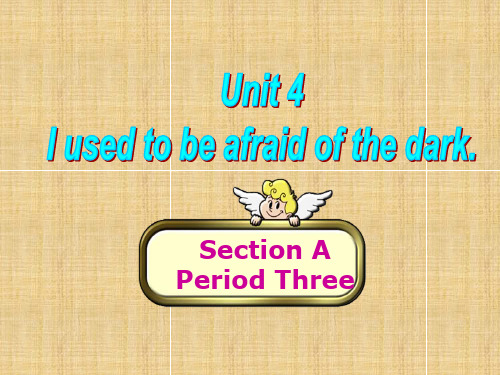
the dark
being alone
snakes
high places
4c Which of these things did you use to be afraid of? Which ones are you still afraid of? Check the boxes and then ask your partner.
Did you use to be afraid of the dark?
Yes, I did. And now I’m still afraid of the dark.
根据汉语提示完成句子,每空一词。
1. Lucy __is_ _a_f_ra_i_d_ _o_f_(害怕) the dark, so she never goes out at night.
4a Write sentences about the past using used to.
1.dGidrna’ctePuulsseeeadtostwoeawtacfhticnhailasohtlootf4omfaTovVi.eSs.he
2. My moomn upseadgtoeha2v8e cuarnlydhair. She
Section A Period Three
Words Review
European
African
British speech public
in public
adj. 欧洲(人)的 n. 欧洲人 adj.非洲(人)的 n. 非洲人 adj. 英国(人)的 n. 讲话,发言 n. 民众; adj. 公开的;公众的
but now she reads at least six books a year.
【人教新目标版】2019版九年级英语全册:全一册学案-九年级英语全册-13
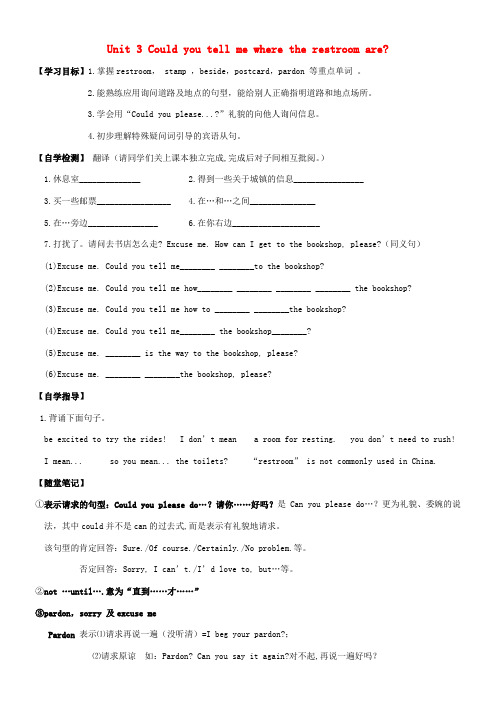
Unit 3 Could you tell me where the restroom are?【学习目标】1.掌握restroom, stamp ,beside,postcard,pardon 等重点单词。
2.能熟练应用询问道路及地点的句型,能给别人正确指明道路和地点场所。
3.学会用“Could you please...?”礼貌的向他人询问信息。
4.初步理解特殊疑问词引导的宾语从句。
【自学检测】翻译(请同学们关上课本独立完成,完成后对子间相互批阅。
)1.休息室______________2.得到一些关于城镇的信息________________3.买一些邮票_________________4.在…和…之间_______________5.在…旁边________________6.在你右边____________________7.打扰了。
请问去书店怎么走? Excuse me. How can I get to the bookshop, please?(同义句)(1)Excuse me. Could you tell me________ ________to the bookshop?(2)Excuse me. Could you tell me how________ ________ ________ ________ the bookshop?(3)Excuse me. Could you tell me how to ________ ________the bookshop?(4)Excuse me. Could you tell me________ the bookshop________?(5)Excuse me. ________ is the way to the bookshop, please?(6)Excuse me. ________ ________the bookshop, please?【自学指导】1.背诵下面句子。
2018届九年级英语全册《Unit4Iusedtobeafraidofthedark(第3课时)》教案人教新目标版

反意疑问句: 陈述句, didn’t / usedn’t +主语?
四、 【教后反思】
7
Pair work :Activity 4c IV. 实践 应用 Which of these things did you use to be afraid of? Which ones are you still afraid of? Check the boxes and then ask your partner. A: Did you use to be afraid of the dark? B: Yes, I did. And now I’m still afraid the dark. A: Did you use to be afraid of giving a speech in public? B: Yes, I did. I’m still afraid of it. A: Used you to be afraid of flying?
3.
Activity 4b
1) Look at the information and write sentences about Emily. 2) Share the answers. Emily didn’t use to eat a lot of vegetables, but now she loves carrots and tomatoes. Emily used to listen to pop music, but now she enjoys country music. 4. Pair work Ask and answer in pairs according to the pictures. A: What did you use to be afraid of? B: I used to be afraid of the dark. A: Are you still afraid of it now? B: Yes, I am. / No, I’m still afraid of being alone. 1. Speaking
(共14套)最新人教新目标版 九年级英语(全册)教学案汇总(含全册内容)(打包下载)
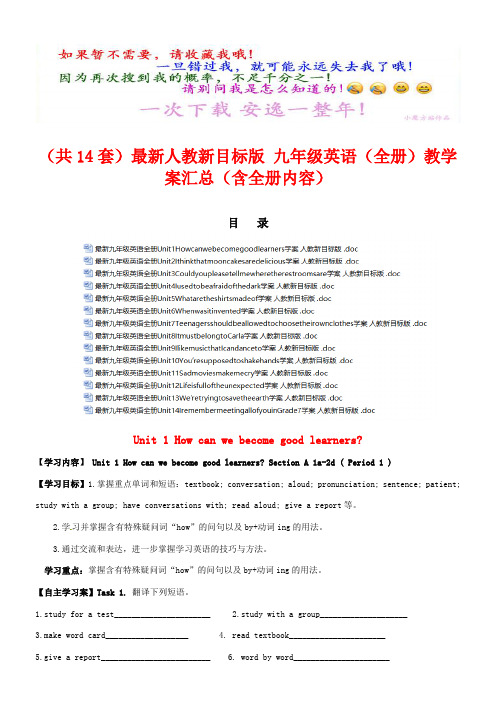
(共14套)最新人教新目标版九年级英语(全册)教学案汇总(含全册内容)目录Unit 1 How can we become good learners?【学习内容】Unit 1 How can we become good learners? Section A 1a-2d ( Period 1 )【学习目标】1.掌握重点单词和短语:textbook; conversation; aloud; pronunciation; sentence; patient; study with a group; have conversations with; read aloud; give a report等。
2.学习并掌握含有特殊疑问词“how”的问句以及by+动词ing的用法。
3.通过交流和表达,进一步掌握学习英语的技巧与方法。
学习重点:掌握含有特殊疑问词“how”的问句以及by+动词ing的用法。
【自主学习案】Task 1. 翻译下列短语。
1.study for a test______________________2.study with a group____________________3.make word card___________________4. read textbook______________________5.give a report_________________________6. word by word______________________7.大声朗读_________________________ 8.对话____________________________9.练习发音__________________________Task 2. I study for a test by____________________________________________I learn English by________________________________________________【合作学习案】e g. A: How do you study for s test? / learn English?B:I study for a test / learn English by...①—How do you study for a test? —I study by working with a group.②We usually go to school by bike.③English is spoken by many people.by的意思是“通过……的方式”时,后接;当表示“乘坐”时, 后跟;它还可以表示 , 用于被动语态,引导出动作的发出者。
最新人教版九年级全册英语专题复习教案全集

最新人教版九年级英语复习教案全集(全册)目录Unit 1 How can we become good learners? 复习教学设计Unit 2 I think that mooncakes are delicious!复习教学设计Unit 3Could you please tell me where the restrooms are?复习教学设计Unit 4 I used to be afraid of the dark复习教学设计Unit 5 What are the shirts made of复习教学设计Unit 6 When was it invented单元复习教学设计Unit 7 Teenagers should be allowed to choose their own clothes单元复习教学设计Unit 8 It must belong to Carla单元复习教学设计Unit 9I like music that I can dance to.单元复习课教学设计Unit 10 You’re supposed to shake hands单元复习课教学设计Unit 11Sad movies make me cry.单元复习教学设计Unit 12Life is full of the unexpected单元复习教学设计Unit13We’re trying to save the earth! 单元复习课教学设计Unit 14 I remember meeting all of you in Grade 7复习教学设计人教版新目标英语九年级Unit 1 How can we become good learners? 复习教学设计一、设计说明复习课是课堂教学的重要组成部分,是提高教学质量的重要环节,优化设计、精心组织好复习课教学,对学生系统掌握知识、发展思维能力、提高复习效率具有极为重要的作用。
人教版新目标九年级英语全册教案
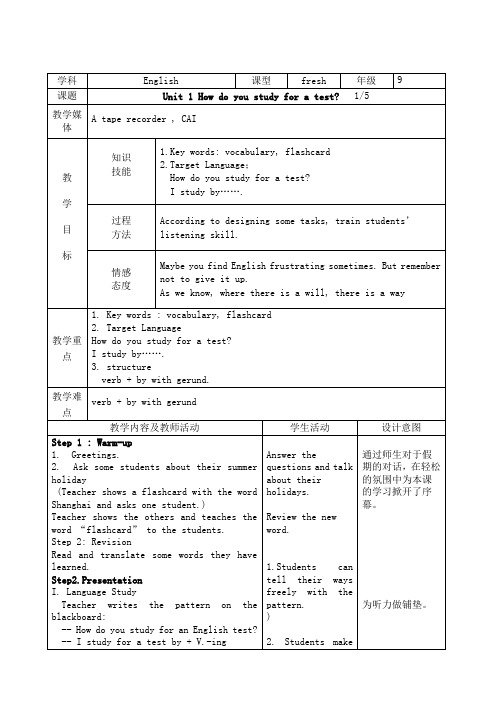
Unit 3 Teenagers should be allowed to choose their own clothes.Section AThe Third PeriodTarget language:A: What rules do you have at home?B: Well, I'm not allowed to go out on school nights. How about you?A: I'm not allowed to go out on school nights either. But I can study at a friend's house.This activity reviews the use of always,sometimes, usually and never.Point to the picture. Ask students to describe what is happening in the picture.Help students to say, The boy is late for class. Invite a student to read the four questions in the box to the class.Read the instructions and remind students of the exact meanings of the adverbs of frequency.Ask students to write A after things they always do, U after things they usually do, S after things they sometimes do and N for things they never do.II. 1bThis activity provides oral practice using the target language.Point out the sample conversation. Ask a pair of students to say it to the class.As the pairs work together, walk around the room offering help if necessary.Ask several pairs to share their conversations with the class.III.2aThis activity provides practice in Look at thepictures and saywhat is happeningin each picture.Students finishthe task on theirown in1aPair work.Talk with his/herpartner abouthis/her answers inActivity 1a.对看图作文能力进行培养。
人教版英语9年级全册Unit2_SectionB(1a-1d)教案

结合听力内容,进行目标句型学习与操练。
创编新的对话,巩固拓展学生词汇及语言能力。
1.学生是否能用已学的目标词汇或句型回答问题
2.学生是否能朗读目标句型。
学生能否运用所学目标词汇,创编新的对话
DELC7
4
评价学生学习
(附教学设计)
步骤
过程
措施(教师活动与学生活动)
目的
持续性评价
DELC4
1
预备与激活先期知识
Step 1
Greeting and Leading in ( 3mins )
Greet the class, have a revision about exclamatory and objective clause.
4. “Trick or treat” means kids will ______ a trick on you if you don’t ____ them a treat.
Listen again and read follow the tape.
巩固目标词汇,句型,为后续听力做准备和铺垫。结合目标句型进行操练。
make pumpkin lanterns,
dress up and wear masks,
have a special party,
paint the face…
回顾旧知,引出新知。
利用图片,帮助学生根据已知的一些背景知识,回答问题
【提示:此处课堂上教师可让学生使用同步学习卡进行抢答 ,根据结果反馈,进行精准教学。】
Step 5
Role-play
(5 mins)
人教新目标九年级英语全册教案Unit2教案
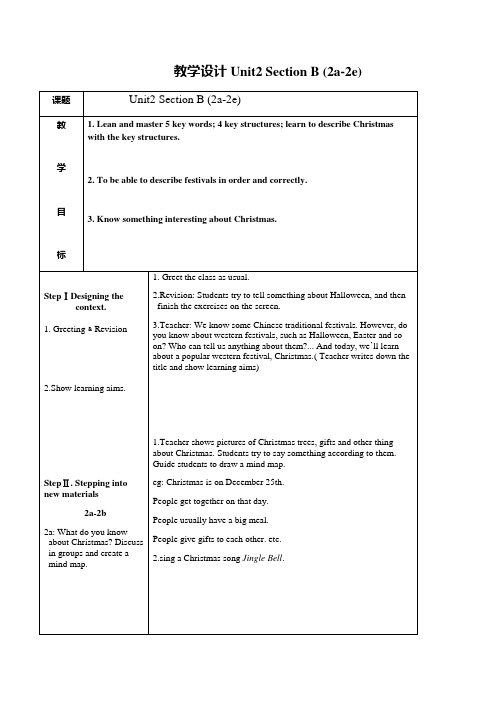
The girl never cares about others.
Marleyused tobe just like Scrooge.
used to意为“过去常常”,后接动词原形,表示过去的习惯,只表示过去和现在的对比,暗指现在已经不存在的动作或状态。
2.Phrases:
1. think about
2. care about
3. used to do sth.
4. warn sb. to do sth.
5. end up
6. remind sb. of sth.
7. decide to do
8. promise to do
9. treat sb. with sth
eg: Christmas is on December 25th.
People get together on that day.
Peopleusuallyhave a big meal.
People give gifts to each other. etc.
2.sing a Christmas songJingle Bell.
2. Does Scrooge have a lot of friends? Why or why not?
3. Why was JacobMarleypunished after he died?
4. Does Marley want to help Scrooge? How do you know?
A Christmas Carol is afamousshort novelwrittenbyCharles Dickens.
Unit6SectionA(3a-3c)教学设计2023-2024学年人教新目标九年级英语全册

(4) 学生可以关注一些环保科技的发展,了解最新的环保科技成果,培养自己的科技素养和创新能力。
(5) 学生可以学习和借鉴一些环保人物的先进事迹,树立正确的价值观和人生观,激发自己的环保热情和社会责任感。
答案:
1. pollution
2. water
3. air
4. wildlife
5. habitats
例题2:
题目:根据文章内容,选择正确的句子。
A. We should plant more trees to protect the environment.
B. We should not use plastic bags to protect the environment.
例题5:
题目:根据文章内容,将句子补充完整。
S: Many animals are in danger.
S: Many animals are in danger because their habitats are being destroyed.
例题6:
题目:根据文章内容,选择正确的短语。
A. protect...from...
教学实施过程
1. 课前自主探索
教师活动:
- 发布预习任务:通过在线平台或班级微信群,发布预习资料(如PPT、视频、文档等),明确预习目标和要求。
- 设计预习问题:围绕“保护环境”的主题,设计一系列具有启发性和探究性的问题,引导学生自主思考。
- 监控预习进度:利用平台功能或学生反馈,监控学生的预习进度,确保预习效果。
(3)合作学习法:鼓励学生分组讨论,培养他们的团队协作能力和沟通能力。
人教版英语九年级全册Unit1 SectionB(2a-Self Check)名师教案

Unit1 SectionB〔2a-Self Check〕名师教案【教材版本与册数】新目标人教版九年级全一册【单元名称】Unit 1 How can we become good learners?【课时】Section B 2a-Self Check〔第5课时〕【课型】Reading and Writing〔读写课〕【本课时教学设计】附:教学活动设计DELC5 2获取新知识Step2Pre-reading(5mins)2a What good learning habits can you think of?Make a list and discuss them with your partner.Being careful in class.Having an interest in the subject.Preparing before class.Reviewing after class.Asking questions in class or after class.Having a study partner.利用讨论好的学习习惯,涉及到阅读中的的内容,为后面的阅读文本奠定根底。
局部学生应该能利用此策略获取有效信息.Step 3 Whil e-rea ding (15 mins ) 1. Fast-reading2b Read quickly. Which four habits of successfullearners are mentioned?Creating an interest in what they learnPracticing and learning from mistakesDeveloping their study skillsAsking questions2.Careful-reading2c Read the passage again and answer the questions.1)Does the writer think that everyone is born withthe ability to learn well? Do you agree? Why or Whynot?2)Why is it a good idea to connect something youneed to learn with something you are interested in?3)What do the sayings〞Use it or lose it〞and〞Practice makes perfect〞mean? Do you agree withthem?4)Do good learners learn from mistakes or are theyafraid of making mistakes?5)What study skills does the writer talk about? Do1.培养学生快速阅读,掌握文章大意的阅读技巧。
人教新目标九年级英语全册Unit1SectionB教案教学设计

4.学生能够通过听力练习,提高获取关键信息的能力,并能够进行有效的信息筛选和整合。
5.学生能够运用所学知识,通过写作表达个人目标,并能够进行合理的论述和解释。
(二)过程与方法
1.通过小组讨论,培养学生的合作意识和团队精神,激发学生主动学习的兴趣。
五、作业布置
1.写作作业:要求学生结合课堂讨论的个人目标,撰写一篇不少于100词的英语短文,描述自己的短期和长期目标,并阐述为实现这些目标所采取的措施。此作业旨在巩固学生对本节课词汇和语法的掌握,并提高学生的写作能力。
提示:可以引导学生运用一般现在时和现在进行时描述目标及行动计划。
2.口语作业:学生分组,每组选择一个话题,如“如何克服困难实现目标”、“我的梦想之旅”等,进行角色扮演或小组讨论,并录制视频。要求每个学生都参与其中,展示自己的口语表达能力。
(三)情感态度与价值观
1.培养学生树立明确的学习目标,激发学生为实现目标而努力奋斗的信心和决心。
2.培养学生具备积极向上的心态,面对挑战时能够保持乐观,勇于克服困难。
3.通过学习他人的成功经验,引导学生学会欣赏他人,培养良好的团队合作精神。
4.培养学生具备责任感和自律性,明确自己的学习目标,并为实现目标付出努力。
2.利用问题引导法,引导学生思考个人目标的重要性,激发学生的学习动机。
3.运用任务型教学法,设计丰富的课堂活动,如小组竞赛、角色扮演等,让学生在实践中掌握知识。
4.通过阅读和听力训练,培养学生的批判性思维和逻辑推理能力。
5.创设真实的语境,让学师可选取与课堂话题相关的听力材料,帮助学生巩固所学知识。
5.课后反思:要求学生针对本节课的学习内容,进行自我反思,总结自己在目标设定和行动计划方面的收获,以及需要改进的地方。
人教版新目标九年级英语全册(全英文表格式)教案设计
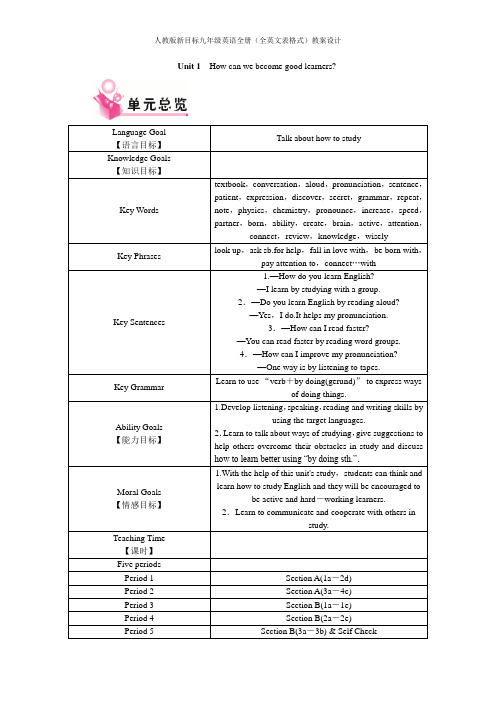
Unit 1How can we become good learners?Language Goal【语言目标】Talk about how to study Knowledge Goals【知识目标】Key Words textbook,conversation,aloud,pronunciation,sentence,patient,expression,discover,secret,grammar,repeat,note,physics,chemistry,pronounce,increase,speed,partner,born,ability,create,brain,active,attention,connect,review,knowledge,wiselyKey Phrases look up,ask sb.for help,fall in love with,be born with,pay attention to,connect…withKey Sentences1.—How do you learn English?—I learn by studying with a group. 2.—Do you learn English by reading aloud?—Yes,I do.It helps my pronunciation.3.—How can I read faster?—You can read faster by reading word groups. 4.—How can I improve my pronunciation?—One way is by listening to tapes.Key Grammar Learn to use “verb+by doing(gerund)” to express waysof doing things.Ability Goals 【能力目标】1.Develop listening,speaking,reading and writing skills byusing the target languages.2.Learn to talk about ways of studying,give suggestions to help others overcome their obstacles in study and discuss how to learn better using “by doing sth.”.Moral Goals 【情感目标】1.With the help of this unit's study,students can think and learn how to study English and they will be encouraged to be active and hard-working learners. 2.Learn to communicate and cooperate with others instudy.Teaching Time【课时】Five periodsPeriod 1 Section A(1a-2d)Period 2 Section A(3a-4c)Period 3 Section B(1a-1e)Period 4 Section B(2a-2e)Period 5 Section B(3a-3b) & Self Check本单元围绕学习的话题,讲述了学习的障碍及对应的解决方法,对学生的学习有重要意义。
人教版新目标九年级上册英语全册教案集
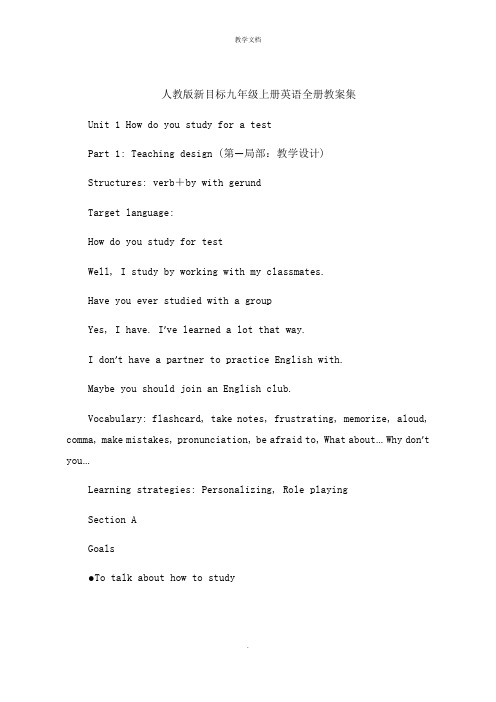
人教版新目标九年级上册英语全册教案集Unit 1 How do you study for a testPart 1: Teaching design (第—局部:教学设计)Structures: verb+by with gerundTarget language:How do you study for testWell, I study by working with my classmates.Have you ever studied with a groupYes, I have. I’ve learned a lot that way.I don’t have a partner to practice English with.Maybe you should join an English club.Vocabulary: flashcard, take notes, frustrating, memorize, aloud, comma, make mistakes, pronunciation, be afraid to, What about…Why don’t you…Learning strategies: Personalizing, Role playingSection AGoals●To talk about how to study●To read about how to studyProceduresWarming up by greetingHello, everyone!From now on you are a ninth grader. Congratulations to you and I wish you a great success in your studies!Today we shall take up the first unit in this new term, Unit 1 How do you study for a testLook at the blackboard and read after me the target language for this unit. When you read pay attention to the structure of the sentence.▲How do you study for test▲Well, I study by working with my classmates.▲Have you ever studied with a group▲Yes, I have. I’ve learned a lot that way.▲I don’t have a partner to practice English with.▲Maybe you should join an English club.Learning to Learn is very important. And learning to pass a test is also very important to you.Learning couldn’t be easier!If you have not developed good ways or methods to study for a test, talk to your classmates about it, your parents, or the teacher like me if you are brave enough. You should be brave enough to talk to others about your problems with your studies.Next I’d like to give you some useful practical advice about studying for a test and also ask you questions to make you think about things such as:▲using your time effectively▲motivation▲how to learn your lessons in the ninth grade year▲different modes of teaching you may meet▲how to develop particular skills, such as note-taking in class 1A: Checking the ways you studyNext turn to page 2 and check √ the ways you study for an English test. Then add other ways you use sometimes.▲How do you study for a testI study for a test___By reading to the tape; By underlining the expressions; By reading beyond the text; By doing used exam papers; By going over exercises books; By copying down the text; By learning the text by heart; By speakingwith classmatesNow raise your hand and report your added ways to the class. I will make a list of all the added ways on the blackboard.1b Listening and writingListen to understand how these people in the picture on page 2 study for a test. Write letters from the pictures. While listening, pay attention to the structures of the sentences.Section A 1b TapescriptBoy1: Hey, gang. There’s a big test on Tuesday. I really need some help. Can you tell me how you study for a big testVoices: Sure! Yes. Sure we will.Boy1: You did really well on the last English test, didn’t you, Mei Girl1: Yeah, I did OK.Boy1: Well, how did you study?Girl1: By making flashcards.Boy1: Maybe I’ll try that. How did you study, PierreBoy2: By asking the teacher for help. She was really happy I asked.Boy1: That’s interesting. How do you study, AntonioBoy3: I like to study by listening to cassettes. But sometimes mymother thinks I’m listening to music. And then she gets mad.Boy1:Oh, well…1c Doing a pairworkNow in pairs ask your partner how he or she studies for a test.A: How do you study for a testB: I study by working with a group.C: I study by listening to English.D. I study by playing games with my classmates.E. I study by doing actions such as coloring, matching.F. I study by singing English songs.G. I study by writingletters and emails.H. I study by acting out simple dialogues.I. I study by listening to and understanding stories.J. I study by writing simple sentences.K. I study by imitating from the recording.L. I study by speaking out words or phrases.M. I study by doing simple role plays.N. I study by reading and understanding simple stories.O. I study by using daily expressions.P. I study by performing short plays.Q. I study by performing simple rhymes.R. I study by writing sentences for pictures.S. I study by writing out simple poems.T. I study by reading aloud correctly.U. I study by playing text plays.V. I study by working with classmates.W. I study by going over the text before class.X. I study by copying words and expressions.Y. I study by looking and saying.Z. I study by asking others questions.2a Listening and checkingNow let’s go to page 3. Listen to the tape and check the questions you ask.While listening, pay attention to the structures of the sentences.Section A 2a, 2b TapescriptGirl1: Welcome to the English club. Today we’re going to talk about the best ways to learn English. Who has an ideaBoy1: Do you learn English by watching English-language videos Girl2: No. It’s too hard to understand the voices.Boy1: What about keeping a diary in English Do you learn English that wayGirl2: I think so. It helps to write English every day.Girl3: Have you ever studied with a groupGirl2: Yes, I have! I’ve learned a lot that way.Girl1: Do you ever practice conversations with a friendGirl2: Oh, yes. It improves my speaking skills.Boy1: What about reading aloud to practice pronunciationGirl3: I do that sometimes. I think it helps.Boy2: I do too. And I always look up new words in a dictionary.Girl3: That’s a great idea!2b Listening and matchingListen again and match each question from 2a with an answer in the box on page 3.2c Doing a pairworkNext we are going to make a conversation in pairs using the information from activities 2a and 2b.A: Have you ever studied with a groupB: Yes, I have. I’ve learned a lot that way.A: Have you ever learned English by watching videosB: Yes, I have. I’ve learned a lot that way.A: Have you ever practiced conversations with friendsB: Yes, I have. I’ve learned a lot that way.A: Have you ever listened to tapesB: Yes, I have. I’ve learned a lot that way.A: Have you ever read aloud to practice pronunciationB: Yes, I have. I’ve learned a lot that way.3a Reading the article and completing the chart1.Reading to the tapeWe are going to read the article on page 4. First we shall read to the tape together. That is, we start reading aloud as the recorder goes, and we stop reading aloud as the recorder stops. While reading, let’s pay enough attention to the pauses, the pronunciation and the intonation of the native reader. Make our reading aloud as the same as the reader’s.2.Reading and dividing the article into partsNext we are going to read aloud the article slowly and clearly. We will try to divide it into thought groups.3.Reading and underliningWe shall read the article once again, this time, to underline all the useful expressions in it. After school, you are going to write them down in your notebook.This week/ we asked students/ at New Star High School/ about the best ways/ to learn more English. Many said/ they learnt/ by using English. Some students had more specific suggestions. Lillian Li, for example, said/ the best way/ to learn new words/ was by reading English magazines. She said that/ memorizing the words of pop songs/ also helped/ a little. When we asked about studying grammar/ she said, “I never study grammar. It's too boring.〞Wei Ming feels differently. He's been learning English/ for six years/ and really loves it. He thinks/ studying grammar /is a great way/ to learn a language. He also thinks that/ watching English movies/ isn't a bad way/ because he can watch the actors/ say the words. Sometimes, however, he finds watching movies/ frustrating/ because the people speak too quickly.Lin Chang said that/ joiningthe English club/ at school/ was the best way/ to improve her English.Students get lots of practice/ and they also have fun. She added that/ having conversations/ with friends/ was not helpful/ at all. ;We get excited/ about something/ and then/ end up speaking/ in Chinese,〞 she said.4.Translating and completing the chartBecause you have read this article many times you are going to translate it into Chinese first and then complete the chart on page 4.Who will be the first to have a tryWays of learning EnglishNot successfulOKSuccessfulLillian LiStudying grammarmemorizing the words of pop songsreading English magazinesWei Mingwatching movieswatching English moviesstudying grammar Liu Changhaving conversations/ with friendsjoining the English club3b Doing a pairworkSilence, please! We are going to have a role play in pairs. One of the pair is to be one of the people in 3a. The other is to interview him or her about learning English.Zhao: Excuse me, Li Hong. Could you help me with my EnglishLi: Yes, please. What’s the matterZhao: I have difficulty studying grammar.Li: Grammar I never studying grammar. I study English mostly by memorizing the words of pop songs.Zhao: No grammar at allLi: Yes, I did study grammar. But I study it by reading English magazines. I put grammar learning into reading articles. That is the best way to understand English grammar.4 Doing a pairworkTurn to page 4 to check √what you do to learn English in the box.Closing down by asking and answering—How did you learn English *I listened to English them every day.*I read English books many times a day.*I learned many English songs by heart.*I sang the English songs to myself.*I learned every new English word in the text.*I learn English by going to English classes.*I do English homework at school.*I read English textbooks in the evening.*I speak English very slowly.*I play computer games in English.*I read a lot of English sentences in the morning.*I do well in class English tests.*I get a lot of good advice on learning English from my teacher. *I discuss English problems with my classmates.*I follow the advice from my father.*I learn English sounds from the tape.*I use English-English dictionaries.*I listen to recordings and English-language TV.*I talk to native speakers every chance I got.*I read books in English, mostly novels.*I learn a lot of new words from English books.*I write more and more e-mail in English.*I use English more than my first language.*Most of my reading (websites and books) is in English. Section BGoals●To listen about learning English●To talk about learning English●To read about learning EnglishProceduresWarming up by reading to the recordingHello, everyone. To begin with, let’s listen and read to the recording of the text HOW DO YOU LEARN BEST That is, read aloud to the tape, as fast as the tape goes, as clearly as the native reader reads. OK Here we go!My cat speaks English.Sometimes my cat comes to me and tells me that she is hungry. Or that her leg hurts. How does my cat tell me these things I don't speak pussy-cat language.1a Reading and checkingLearning English can be both easy and difficult. What things are easy for you And what things are difficult for you Now turn to page 5, read the list on the top and check √the statements that are true for you.1b Making a listYou have read and checked the statements true for you. Now thinkand make a list of other things difficult for you, too.I don’t know how to…!1. I don’t know how to use commas.2. I don’t know how to work with others.3. I don’t know how to make flashcards.4. I don’t know how to read the textbook.5. I don’t know how to make vocabulary lists.6. I don’t know how to listen to tape.7. I don’t know how to ask the teacher for help.8. I don’t know how to study for a test.9. I don’t know how to work with a group.10. I don’t know how to watch English videos.11. I don’t know how to practiceconversations with friends.12. I don’t know how to read aloud to practice pronunciation.13. I don’t know how to learn by using English.14. I don’t know how to get more specific suggestions.15. I don’t know how to read English magazines.16. I don’t know how to learn new words.17. I don’t know how to memorize the words.18. I don’t know how to studying grammar19. I don’t know how to watching English movies20. I don’t know how to joining the English club21. I don’t know how to improve her English22. I don’t know how to get lots of practice13. I don’t know how to ask teachers about the best ways to learn more English.2a Listening and checkingPaul is a nice boy. He works hard at his English, but still has many learning challenges. Now listen to find out what challenges he has and check them in the box on page 5.Challenges to Paul at learning English1._____ can’t get the pronunciation right.2._____ forget a lot of new words.3._____ can’t understand when people talk to me.4._____ can’t understand the words in magazines.5._____ don’t get much writing practices.2b Listening and matchingNow listen again to Paul talking about his challenges at learning English and match them with the solutions listed in the box on page 5. While listening, pay attention to the structures of the sentences.TapescriptTeacher: You look worried, Paul.Boy: I am, Ms Mitchell. I’m having trouble learning English.Teacher: You said you liked English. What’s the problemBoy: I can’t get the pronunciation right.Teacher: Well, listening can help. Why don’t you borrow the teacher’s tapes You can listen to them at home and repeat the sentences that are difficult for you.Boy: That’s a good idea. But what about all the new words I forget a lot of new words.Teacher: You can always write the new words in your notebook and study them at home. You can even study in the train on the way to school.Boy: That might really help! Thanks.Teacher: Can you understand when people talk to youBoy: Well, no. Not always. Sometimes I just don’t understand what people are saying.Teacher: Why don’t you join an English language club to practicespeaking English The English club meets after school on Tuesdays and Thursdays.Boy: Maybe I’ll go. The only other problem I have is that I don’t get much writing practice.Teacher: Maybe you should find a pen pal.Boy: That sounds like a fun way to practice writing. Thanks, Ms Mitchell.2c Doing pairworkIN pairs we are going to role play conversations using the information from activities 2a and 2b.I don’t have a partner to practice English with.Maybe you should join an English language club.I can’t get the pronunciation right.Listening can help.I forget a lot of new words.Write the new words on cards and study them daily.I can’t understand when people talk to me.You can join an English club to talk to people more in English.I can’t understand the words in magazines.You can look them up ina dictionary.I don’t get much writing practices.Start writing an English diaryevery day.I read very slowly.You should read to the recording of the text.I make mistakes in grammar.Why don’t study the basic sentence patterns3a Reading and cuttingIt’s time to read the text HOW I LEARN ENGLISH. Now read and check (/) the sentences.We are going to read the text again to study the form and function of all the predicate verbs.How I learned to learn EnglishLast year/ my English class/ was difficult/ for me. First of all, it wasn't easy/ for me/ to understand the teacher/ when she talked to the class. To begin with, she spoke/ too quickly, and I couldn't understand every word. Later on, I realized that/ it doesn't matter/ if you don’t understand /every word. Also/ I was afraid to speak/ in class, because/ I thought/ my classmates/ might laugh at me. I couldn't always make complete sentences, either. Then/ I started to watch English-language TV. It helped/ a lot. I think that/ doing lots of listening practice/ is of the secrets of becoming a good language learner. Anotherthing/ that I found/ very difficult/ was English grammar. So/ I decided to take lots of grammar notes/ in every class. Then/ I startedto write my own original sentences/ using the grammar/(that) I was learning. It’s amazing/ how much/ this helped. Now/ I am enjoying learning English/ and I got an A/ this term. My teacher is very impressed.Next we shall read the text for the third time to underline all the useful expressions. After class you are to copy them into your notebook.All right, read the text the fourth time and circle all the signal words, or the linking words which connect all the short sentences.Now you may read the statements in the box on page 6 following the text. Write “T〞 or “F〞 beside each statement.3b Writing a letterYour friend Lin Feng is having difficulties with her English. Write her a letter telling her how to become a better English learner.Dear Lin Feng,I know it isn’t easy to learn English, but I have some ideas that may help. You said you couldn’t understand people who talked fast. Well, you can try to listen for the most important words, not every word. It is difficult to understand by listening what you have not read or what you can’t understand well by reading. To listen well you have to read well. So keep on reading English. Listening and reading to the recording of the text is very important, too. Every text, after being read, should be listened to and read aloud to the tape. At first you may find itdifficult to follow the reader reading aloud the text. Don’t worry. If you keep practicing you will be able to read aloud as fast as the native reader from the tape. And then you can understand people who talk fast in English.Yours,Tai Zuo3c Writing an articleYou have been learning English for at least three years. That is such a long time. Now think about the things that have helped you the most in learning English. Write an article telling others about them.4 Doing an interviewNext we shall do an interview in groups of four. Ask the three group mates about learning English. Take notes of what they say. Tomorrow you shall stand to tell the class about their answers.Q. What isn’t easy about learning EnglishA. Reading is not easy.Q. What do you do about thisA. I try to cut the sentences into thought groups.Q. What is your favorite way to learn more EnglishI read and read aloud a lot. These are the best way.Closing down by singTo end this period let’s sing an English song.Rain, rain, go away,Come again another day,Little JohnnyWants to play.Rain, rain, go to Spain,Never show your face again.SELF CHECK1.Filling in the blankWe shall make a check on our use of expressions first. Turn to page 7 and fill in each blank with the correct word given. Change the form of the word if necessary. Then make your own sentences with each word.Complete the sentencesMake your sentences1. You should write down new English words in a vocabulary list.Don’t trust your memory. Write it down.2. If you don’t know how to spell new words, look them up in a dictionary.I don’t know how to spell your name.3. The best way to improve your English is to join an English club. I’d like to join the school football tea.4. Another thing that he find very difficult was English grammar.I find it easy to learn English.5. This kind of paper feels very soft.Do you feel cold2.Writing an articleTurn to page 7 and write an article about Xu Zheng using the notes on Xu and his essay.Xu Zheng: a boy fond of EnglishMost people in the world speak English as a second language. And so does Xu Zheng.Yesterday I asked Xu Zheng about his ways to learn English. He said he learns by making up conversations and speaking to friends in English. When I asked about studying pronunciation, he said he spent much time on it, but he still found native speakers’ pronunciation difficult to learn.I said to him, “You are a computer student. Why are you so interested in English〞“English popular in science. And it is popular around the world for computers,〞 he told me. “I likewriting notes, watching movies and listening to pop songs. But I like reading in English online most, 〞 added he.Xu Zheng is right. English can really help us understand many newthings from other countries. Let’s learn from Xu Zheng. Let’s be fond of English, too.IReading: How do we deal with our problemsAs English is learned mostly through reading in China, we shall now turn to page 8 to learn to read the article entitled: How do we deal with our problemBefore reading, please go over the vocabulary list for reading on page 146. Get yourself familiarized with all the words and expressions to be found in the article.While reading try to divide the sentences into thought groups and underline all the expressions useful to you. While you are reading it for the second time, try to circle all the linking words and try translating the text into Chinese.How do we deal with our problemRich or poor, young or old, we all have problems. And unless we deal with our problems, we easily become unhappy. Worrying about our problems can affect how we do at school. It can also influence the way we behave with our families. So how do we deal with our problems There are many ways.By learning to forgetMost of us have probably been angry with our friends, parents or teachers. Perhaps they said something you didn't like, or you feltunfair. Sometimes, people can stay angry for years about a small problem. Time goes by, and good friendships may be lost.When we are angry, however, we are usually the ones affected. Perhaps we have seen young children playing together. Sometimes they have disagreements, and decide not to talk to each other. However, this usually does not last for long. This is an important lesson for us: we can solve a problem by learning to forget.By regarding problems as challengesMany students often complain about school. They might feel they have too much work to do sometimes, or think the rules are too strict. We must learn how to change these ;problems; into ;challenges;. Education is an important part of our development. As young adults, it is our duty to try our best to deal with each challenge in our education with the help of our teachers.By thinking of something worseBy comparing yourself to other people, you will find your problems are not so terrible. Think about Stephen Hawking, for example, a very clever scientist, who regards his many physical problems as unimportant. He can't walk or even speak, but he has become very famous and successful. We are probably quite healthy and smart. Let's not worry about problems. Let's face the challenges instead.After reading, copy the underlined expressions into your PhraseBook as home.Expressions from How do we deal with our problemrich or poor, young or old, have problems, deal with one’s problems, become unhappy, worry about one’s problems, do well at school, influence the way, behave well with…, deal with one’s problems, be angry with…, feel unfair, stay angry for years about…, time goes by, lose good friendships, see… playing together, have disagreements, talk to each other, last for long, an important lesson for…, solve a problem by learning to forget, regarding problems as challenges, complain about school, have too much work to do, the rules are too strict, change…into…, an important part of one’]s development, as young adults, be one’s duty, to try one’s best, to deal with…in one’s education, with the help of…, thinking of something worse, comparing…to…, find one’s problems, think about…, for example, a very clever scientist, regards…as unimportant, become very famous and successful, worry about…, face the challenges Part 2: Teaching Resources (第二局部:教学资源)Tips for BeginnersYou are like a new babyBabies learn their language slowly.First they learn to listen.Then they learn to talk.Finally, they can read and write. Listen to English every dayListen to English radio.Watch English TV.Go to English movies.Use online lessons.Make an English/ESL friendMake up conversations.Practice dialogues.Usebeginner textbooks.Read English storiesStart with children's storybooks.Try ESL readers.Read advertisements, signs and labels. Try EnglishClub for Young Learners. Write down new wordsStart a vocabulary (new word) notebook.Write words in alphabetical order (A...B...C...). Make example sentences.Always use an English-English dictionary first. Keep an English diaryStart with one sentence.How do you feelHow is the weatherWhat did you do todayWrite another sentence tomorrow.Visit an English speaking countryLearn English more quickly.Stay with an English family.Hear native speakers talk.Have a fun experience.Unit 2 I used to be afraid of the dark.Part 1: Teaching design (第—局部:教学设计) Structures: used toTarget language:Mario used to be short.Yes, he did. Now he’s tall.I used to eat candy all the time.Did youYes, I did. And I used to chew gum a lot.Vocabulary: used to, dark, spider, insectLearning strategies: Brainstorming ComparingSection AGoals●To learn about the use of used to●To talk about what you used to be likeProceduresWarming up by learning “used to 〞Hi, everyone. Today we’re going to study Unit 2. Its title is I used to be afraid of the dark. In the title we find a phrase“used to 〞. What does it mean How is it used in Englishused to的用法“used to加不定式〞表示过去常常干某事,现在不在干了。
九年级英语全册Unit5Whataretheshirtsmadeof教案人教新目标版(2021年整

2018-2019学年九年级英语全册Unit 5 What are the shirts made of教案(新版)人教新目标版编辑整理:尊敬的读者朋友们:这里是精品文档编辑中心,本文档内容是由我和我的同事精心编辑整理后发布的,发布之前我们对文中内容进行仔细校对,但是难免会有疏漏的地方,但是任然希望(2018-2019学年九年级英语全册Unit 5 What are the shirts made of教案(新版)人教新目标版)的内容能够给您的工作和学习带来便利。
同时也真诚的希望收到您的建议和反馈,这将是我们进步的源泉,前进的动力。
本文可编辑可修改,如果觉得对您有帮助请收藏以便随时查阅,最后祝您生活愉快业绩进步,以下为2018-2019学年九年级英语全册Unit 5 What are the shirts made of教案(新版)人教新目标版的全部内容。
Unit 5 What are the shirts made of?The First PeriodSection A(1a—2d)Ⅰ.Teaching aims1.Knowledge aims:(1)Key words:chopstick,coin,fork,blouse,silver,glass,cotton,steel,leaf,produce,widely,process(2)Key phrases:be made of ,be made in,environmental protection,be made from,be famous for,beknown for ,as far as I know,by hand(3)Important sentences:①A:This ring looks nice。
Is it made of silver?B:Yes,and it was made in Thailand。
②Where is tea produced in China?③It seems that many people all over the world drink Chinese tea.④People say that tea is good for both health and business.2.Ability aims:Learn to express own ideas using“be made of"or “be made in”.3.Emotion aims:Let students fall in love with Chinese tea culture.Ⅱ.Important points:Make sentences by using “be made of”。
人教版新目标版九年级英语全册Un...
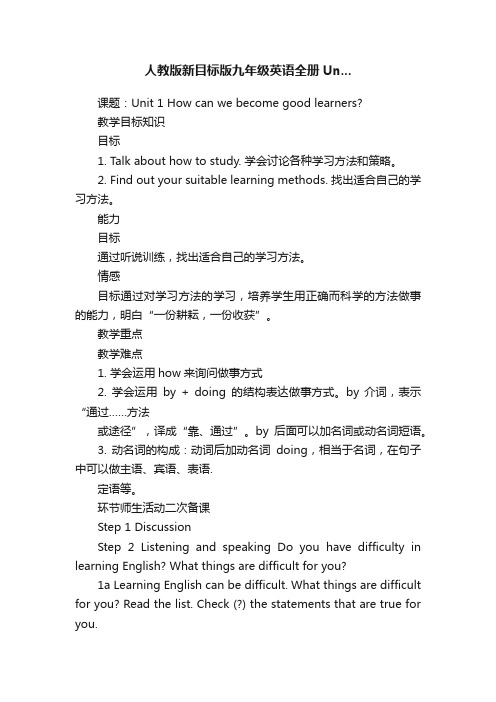
人教版新目标版九年级英语全册Un...课题:Unit 1 How can we become good learners?教学目标知识目标1. Talk about how to study. 学会讨论各种学习方法和策略。
2. Find out your suitable learning methods. 找出适合自己的学习方法。
能力目标通过听说训练,找出适合自己的学习方法。
情感目标通过对学习方法的学习,培养学生用正确而科学的方法做事的能力,明白“一份耕耘,一份收获”。
教学重点教学难点1. 学会运用how来询问做事方式2. 学会运用by + doing的结构表达做事方式。
by 介词,表示“通过……方法或途径”,译成“靠、通过”。
by后面可以加名词或动名词短语。
3. 动名词的构成:动词后加动名词doing,相当于名词,在句子中可以做主语、宾语、表语.定语等。
环节师生活动二次备课Step 1 DiscussionStep 2 Listening and speaking Do you have difficulty in learning English? What things are difficult for you?1a Learning English can be difficult. What things are difficult for you? Read the list. Check (?) the statements that are true for you.____ I can't pronounce some of the words.____ I can't always understand spoken English.____I don't know how to increase my reading speed. 1c Paul finds it difficult to learn English. Listen and complete the learning challenges he talksabout.1d Listen again. Complete the solutions.1e Role-play conversations using the information in 1c and 1d.Step 4 ReadingStep 5 Language pointsA: I don’t have a partner to practice English with.B: Maybe you should join an English club.注解: Maybe you should join an English club. 2b Read the passage quickly. Which four habits of successful learners are mentioned?2c Read the passage again and answer the questions.1. Does the writer think that everyone is born withthe ability to lear n well? Do you agree? Why or why not?2. Why is it a good idea to connect something youneed to learn with something you are interested in?3. What do the sayings "use it or lose it" and"practice makes perfect" mean? Do you agree with them?4. Do good learners learn from mistakes or are they afraid of making mistakes?5. What study skills does the writer talk about? Doyou have those study skills?6. Do you agree that learning is a lifelong journey? Why or why not?1. It is also easier for you to pay attention to it for a long time.该句句型是It is adj. for sb. to do sth.【注】若形容词表示事物特征的,如:easy, difficult, hard, important等,须用介词for。
人教版英语9年级全册Unit9_SectionA(1a-2d)教案

3.能读懂对电影等事物的评论。掌握由that/ who/which引导的定语从句。
4.通过对写作内容和写作方法的分析完成写作任务。
5.通过对本单元语法的复习和巩固,学会归纳与总结。
6.通过小组间的相互合作活动,增长知识,提高审美鉴赏能力。
教学目标
语言知识目标:
1.能掌握以下单词及短语:prefer, lyrics, Australian, electronic, suppose, smooth, spare, director, case, in the case, war
Music that I can dance to
Music that has great lyrics
Music that I can sing along with
Tony
Betty
3.Ckeck the answers.
熟悉表格内容,为听力做准备。
学生是否能听懂听力内容完成表格内容。
Step 4
Ss: I like musicians who …
2.Explain the relative clauses withwho.
谈论喜欢的音乐家,呈现目标句型:I like musicians who …为听力做准备。
Step 3
While-
listening
(听前)(5 mins)
1.Get students read the sentences in 2a and ask some students to tell the Chinese meanings.
3.Listen to the tape for the second time and finish 2b.
- 1、下载文档前请自行甄别文档内容的完整性,平台不提供额外的编辑、内容补充、找答案等附加服务。
- 2、"仅部分预览"的文档,不可在线预览部分如存在完整性等问题,可反馈申请退款(可完整预览的文档不适用该条件!)。
- 3、如文档侵犯您的权益,请联系客服反馈,我们会尽快为您处理(人工客服工作时间:9:00-18:30)。
Unit 1 How can we become good learners?学习目标认知目标:1. Talk about how to study. 学会讨论各种学习方法和策略。
2. Find out your suitable learning methods. 找出适合自己的学习方法。
情感目标:通过对学习方法的学习,培养学生用正确而科学的方法做事的能力,明白“一份耕耘,一份收获”。
技能目标:(1)熟练掌握下列词汇:aloud pronunciation discover repeat note pronounceincrease speed partner create active connect reviewknowledge wisely born attention(2)熟练掌握下列短语:work with friends ask the teacher for helpread aloud look up practice pronunciationconnect…with…pay attention to(3)掌握下列句型:How do you study English?I learn by working with a group.Do you learn English by reading aloud?Yes, I do. It helps my pronunciation.How can I read faster?You can read faster by reading word groups.How can I improve my pronunciation?One way is by listening to tapes.But whether or not you can do this well depends on your learning habits.重点、难点(Key points and difficulties)1. 学会运用how来询问做事方式2. 学会运用by + doing的结构表达做事方式。
by 介词,表示“通过……方法或途径”,译成“靠、通过”。
by后面可以加名词或动名词短语。
3. 动名词的构成:动词后加动名词doing,相当于名词,在句子中可以做主语、宾语、表语定语等。
课时划分Period 1 Section A 1 (1a-2d)Period 2 Section A 2 (3a-3b)Period 3 Section A 3 (Grammar Focus—4c)Period 4 Section B 1 (1a-2e)Period 5 Section B 2 (3a-selfcheck)Section A 1 (1a-2d)Step 1 Warming upT: How do you study English? Do you study English by the following ways? (Show somepictures and present the important phrases.)T: How do you study English?S: I study English by ______.by working with friends.by making word cards.Step 2 1a Check the ways you study English. Then add other ways you sometimes study.___ a. by working with friends.Step 3 Listening1) Listen. How do these students study for a test? Write letters from 1a above.2) Check the answers: b (Meiping); e (Peter); d (Tony)Step 4 GuessShow some pictures.…Guess: How does he/she study English? He/She studies English byHow do they study English? They study English by…Step 5 Pairwork1c Make conversations about how you study for a test.A: How do you study for a test?B: I study by working with a group.A: How do you study for a test?B: I study by…Step 6 Listening2a Listen and check the questions you hear.1 ____ Does anyone learn English by watching videos?2 ____ Do you have c onversations with friends in English?3 ____ What about listening to tapes?4 ____ What about reading aloud to practice pronunciation?5 ____ Have you ever studied with a group?Answers: 1, 2, 4, 52b Listen again. Match each answer below with a question above.a. Yes, I have. I’ve learned a lot that way.b. Oh, yes. It really improves my speaking skills.c. I do that sometimes. I think it helps.d. No. It’s too hard to understand spoken English.Answers: d, b, c, aStep 7 Pairwork1. 2c Make conversations using the information in 2a and 2bA: Have you ever studied with a group?B: Yes, I have. I’ve learned a lot that way.Show some pictures.1) A: Do you learn English by watching movies?B: Yes, it’s a very interesting way.rd to understand spoken English.C: No, it’s too ha2) A: What about writing letters to a pen pal in America?B: Yes, it helps to improve my writing skills and know a lot about America.3) A: Do you have conversations with friends in English?B: Of course, we can talk about plenty of things like school, pets, movies, and our parents.2. 2c Role-play the conversation.Step 8 SummaryHow do you study English?1. by working with friends2. by watching English movies.3. by making word cards.4. by reading the textbook.5. by listening to tapes.6. by asking the teacher for help.7. by reading aloud.…【结论】1) by可表示位置,(1) “__________”,如句1。
也有“从……旁边(经过)”之意。
2) by可表示交通、传递等的方式,如句2。
3) by可表示时间,“到(某时)之前;不迟于”,如句3。
4) by可用于构成(2) ________,“被,由”,如句4。
5) by可表示方式或手段,(3) “____________”结构在句中作方式状语,“通过……方式(方法)”或“借助……手段”,如句5。
Answers: (1) 在……旁边(2) 被动语态(3) by + V-ing形式【运用】根据提示,用含有by的短语完成各句。
1) Annie went to Beijing _______ (乘火车) yesterday.2) His grandfather made a living _________ (靠卖水果) in the past.3) The scientists have to arrive at the village _________ (八月以前).4) Allen goes _______________ (经过邮局) on his way to school everymorning.5) The book was written ____________ (由几个工程师).Answers: 1) by train 2) by selling fruits 3) by August 4) by the post office 5) by several engineers2. What about reading aloud to practice pronunciation?大声朗读来练习发音怎么样?辨析aloud, loud和loudlyaloud出声地;大声地。
常与read/ call等词连用, 不用于比较级。
不要在图书馆大声朗读。
e.g. Don’t read aloud in the library.loud 大声地;喧闹地。
指说话声和笑声,常与talk/ speak/ laugh/ sing等词连用, 常用比较级。
e.g. We can’t hear you. Please speak louder.我们听不到你的声音。
请再大声点。
loudly 高声地;喧闹地。
